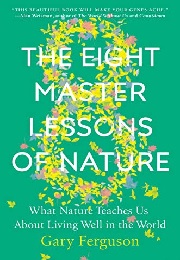Eight Master Lessons of Nature: What Nature Teaches Us About Living Well in the World

Gary Ferguson
Doubleday, £9.99
In the COVID-19 lockdown restrictions many of us became abundantly aware of how much we missed the freedom to be out enjoying, exploring and experiencing our natural environments. The times we were able to get exercise in green surroundings were gratefully appreciated as a restorative tonic to our wellbeing. Ferguson explores some of the principles that are adhered to within the biosphere and how we can learn from and apply them to us personally and within society to our mutual benefit and achieve greater sustainable planetary fitness. The “lessons” include biodiversity, energy efficiency, regenerative growth and interdependence.
The concept of interdependence within ecosystems is hopefully appreciated most fully by biologists. Recently there is a growing awareness, in the wider public, that as humans have separated ourselves, or even seen ourselves as increasingly outside nature. In the industrial and post-industrial ages society has largely been blind to our complete dependence upon it. The concept of interdependence is extended by Ferguson to cooperative relations within society too. The vital roles played by various, frequently overlooked or at best undervalued, professions and workers became paramount during the events of spring this year. The adaptive behaviour of many nations, at that time, also lead to a reduction of air pollution; a possible step to healing our “dis-eased” planet and another lesson from nature.
The text of Eight Master Lessons of Nature is a mine of historical anecdotes and cultural stories from around the world along with rich descriptions of species, habitats and ecosystems, such as the energy efficiency in the South American sloth species and the familiar formations of migratory geese and fish shoals that have inspired planning layouts for vertical axis turbine farms.
The need to embrace the connection between women and nature and recognise the value of female leadership endorses the ecofeminist viewpoint why so humans have put so much out of synch in local, regional and the global environment. These eight lessons are ones Ferguson thought most important, there are others too that will hopefully be included in revised editions such learning the roles from pioneer species through succession to mature ecosystems, painful lessons from the impact of invasive species, or energy conservation and natural biogeochemical cycles.
Doubleday Books has the maxim of publishing books that make you think, feel and remember. This volume fits exactly within this remit. I was fortunate enough to have this very readable book to give me a taste of nature in March this year, it certainly gave me plenty to think about during that silent spring. The lessons are relevant to us all, and should be the foundation stones of our and our children’s education. The words of the text would be equally warming and inspirational during dark winter months if you are looking for a gift that lasts a lifetime.
Dr Alexander Waller CBiol MRSB


